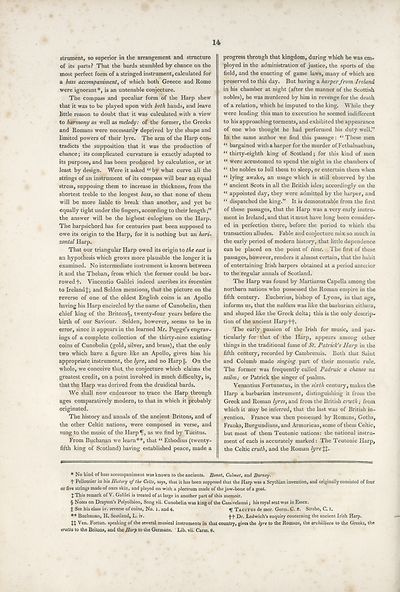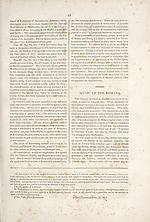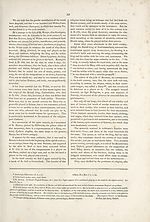Glen Collection of printed music > Printed music > General collection of the ancient music of Ireland
(30) Page 14
Download files
Complete book:
Individual page:
Thumbnail gallery: Grid view | List view

14
strument, so superior in the arrangement and structure
of its parts? That the bards stumbled by chance on the
most perfect form of a stringed instrument, calculated for
a bass accompaniment, of which both Greece and Rome
were ignorant*, is an untenable conjecture.
The compass and peculiar form of the Harp shew
that it w
r
as to be played upon with both hands, and leave
little reason to doubt that it was calculated with a view
to harmony as well as melody: of the former, the Greeks
and Romans were necessarily deprived by the shape and
limited powers of their lyre. The arm of the Harp con¬
tradicts the supposition that it was the production of
chance; its complicated curvature is exactly adapted to
its purpose, and has been produced by calculation, or at
least by design. Were it asked “ by what curve all the
strings of an instrument of its compass will bear an equal
stress, supposing them to increase in thickness, from the
shortest treble to the longest bass, so that none of them
will be more liable to break than another, and yet be
equally tight under the fingers, according to their length
the answer will be the highest eulogium on the Harp.
The harpsichord has for centuries past been supposed to
owe its origin to the Harp, for it is nothing but an hori¬
zontal Harp.
That our triangular Harp owed its origin to the east is
an hypothesis which grows more plausible the longer it is
examined. No intermediate instrument is known between
it and the Theban, from which the former could be bor¬
rowed Vincentio Galilei indeed ascribes its
to Ireland^; and Selden mentions, that the picture on the
reverse of one of the oldest English coins is an Apollo
having his Harp encircled by the name of Cunobelin, then
chief king of the Britons§, twenty-four years before the
birth of our Saviour. Selden, however, seems to be in
error, since it appears in the learned Mr. Pegge’s engrav¬
ings of a complete collection of the thirty-nine existing
coins of Cunobelin (gold, silver, and brass), that the only
two which have a figure like an Apollo, gives him his
appropriate instrument, the lyre, and no Harp||. On the
whole, we conceive that the conjecture which claims the
greatest credit, on a point involved in much difficulty, is,
that the Harp was derived from the druidical bards.
We shall now endeavour to trace the Harp through
ages comparatively modern, to that in which it probably
originated.
The history and annals of the ancient Britons, and of
the other Celtic nations, were composed in verse, and
sung to the music of the Harp^f, as we find by Tacitus.
From Buchanan we learn**, that “ Ethodius (twenty-
fifth king of Scotland) having established peace, made a
progress through that kingdom, during which he was em¬
ployed in the administration of justice, the sports of the
field, and the enacting of game laws, many of which are
preserved to this day. But having a harper from Ireland
in his chamber at night (after the manner of the Scottish
nobles), he was murdered by him in revenge for the death
of a relation, which he imputed to the king. While they
were leading this man to execution he seemed indifferent
to his approaching torments, and exhibited the appearance
of one who thought he had performed his duty well.”
In the same author we find this passage: “ These men
“ bargained with a harper for the murder of Fethalnachus,
“ thirty-eighth king of Scotland; for this kind of men
“ were accustomed to spend the night in the chambers of
<c
the nobles to lull them to sleep, or entertain them when
<£
lying awake, an usage which is still observed by the
<£
ancient Scots in all the British isles; accordingly on the
££
appointed day, they were admitted by the harper, and
££
dispatched the king.” It is demonstrable from the first
of these passages, that the Harp was a very early instru¬
ment in Ireland, and that it must have long been consider¬
ed in perfection there, before the period to which the
transaction alludes. Fable and conjecture mix so much in
the early period of modern history, that little dependence
can be placed on the point of time. The first of these
passages, however, renders it almost certain, that the habit
of entertaining Irish harpers obtained at a period anterior
to the regular annals of Scotland.
The Harp was found by Martianus Capella among the
northern nations who possessed the Roman empire in the
fifth century. Eucherius, bishop of Lyons, in that age,
informs us, that the nablum was like the barbarian cithara,
and shaped like the Greek delta; this is the only descrip¬
tion of the ancient Harpff.
The early passion of the Irish for music, and par¬
ticularly for that of the Harp, appears among other
things in the traditional fame of St. Patrick's Harp in the
fifth century, recorded by Cambrensis. Both that Saint
and Columb made singing part of their monastic rule.
The former was frequently called Padruic a chanos na
sailm; or Patrick the singer of psalms.
Yenantius Fortunatus, in the sixth century, makes the
Harp a barbarian instrument, distinguishing it from the
Greek and Roman lyres, and from the British crwth; from
which it may be inferred, that the last was of British in¬
vention. France was then possessed by Romans, Goths,
Franks, Burgundians, and Armoricas, some of them Celtic,
but most of them Teutonic nations: the national instru¬
ment of each is accurately marked: The Teutonic Harp,
the Celtic cruth, and the Roman lyre IJ.
* No kind of bass accompaniment was known to the ancients. Bonet, Calmet, and Burney.
'f Pellontier in his History of the Celts, says, that it has been supposed that the Harp was a Scythian invention, and originally consisted of four
or five strings made of oxes skin, and played on with a plectrum made of the jaw-bone of a goat.
jThis remark of V. Galilei is treated of at large in another part of this memoir.
§ Notes on Drayton’s Polyolbion, Song vii. Cunobelin was king of the Cassivelauni; his royal seat was in Essex.
(1 See his class iv. reverse of coins. No. 1. and 4. Tacitus de mor. Germ. C. 2. Strabo, C. 1.
•* Buchanan, H. Scotland, L. iv. -J-f Dr. Ledwich’s enquiry concerning the ancient Irish Harp,
tt Ven. Fortun. speaking of the several musical instruments in that country, gives the lyre to the Romans, the archilliaca to the Greeks, the
erotta to the Britons, and the Harp to the Germans. Lib. vii. Carm. 8,
strument, so superior in the arrangement and structure
of its parts? That the bards stumbled by chance on the
most perfect form of a stringed instrument, calculated for
a bass accompaniment, of which both Greece and Rome
were ignorant*, is an untenable conjecture.
The compass and peculiar form of the Harp shew
that it w
r
as to be played upon with both hands, and leave
little reason to doubt that it was calculated with a view
to harmony as well as melody: of the former, the Greeks
and Romans were necessarily deprived by the shape and
limited powers of their lyre. The arm of the Harp con¬
tradicts the supposition that it was the production of
chance; its complicated curvature is exactly adapted to
its purpose, and has been produced by calculation, or at
least by design. Were it asked “ by what curve all the
strings of an instrument of its compass will bear an equal
stress, supposing them to increase in thickness, from the
shortest treble to the longest bass, so that none of them
will be more liable to break than another, and yet be
equally tight under the fingers, according to their length
the answer will be the highest eulogium on the Harp.
The harpsichord has for centuries past been supposed to
owe its origin to the Harp, for it is nothing but an hori¬
zontal Harp.
That our triangular Harp owed its origin to the east is
an hypothesis which grows more plausible the longer it is
examined. No intermediate instrument is known between
it and the Theban, from which the former could be bor¬
rowed Vincentio Galilei indeed ascribes its
to Ireland^; and Selden mentions, that the picture on the
reverse of one of the oldest English coins is an Apollo
having his Harp encircled by the name of Cunobelin, then
chief king of the Britons§, twenty-four years before the
birth of our Saviour. Selden, however, seems to be in
error, since it appears in the learned Mr. Pegge’s engrav¬
ings of a complete collection of the thirty-nine existing
coins of Cunobelin (gold, silver, and brass), that the only
two which have a figure like an Apollo, gives him his
appropriate instrument, the lyre, and no Harp||. On the
whole, we conceive that the conjecture which claims the
greatest credit, on a point involved in much difficulty, is,
that the Harp was derived from the druidical bards.
We shall now endeavour to trace the Harp through
ages comparatively modern, to that in which it probably
originated.
The history and annals of the ancient Britons, and of
the other Celtic nations, were composed in verse, and
sung to the music of the Harp^f, as we find by Tacitus.
From Buchanan we learn**, that “ Ethodius (twenty-
fifth king of Scotland) having established peace, made a
progress through that kingdom, during which he was em¬
ployed in the administration of justice, the sports of the
field, and the enacting of game laws, many of which are
preserved to this day. But having a harper from Ireland
in his chamber at night (after the manner of the Scottish
nobles), he was murdered by him in revenge for the death
of a relation, which he imputed to the king. While they
were leading this man to execution he seemed indifferent
to his approaching torments, and exhibited the appearance
of one who thought he had performed his duty well.”
In the same author we find this passage: “ These men
“ bargained with a harper for the murder of Fethalnachus,
“ thirty-eighth king of Scotland; for this kind of men
“ were accustomed to spend the night in the chambers of
<c
the nobles to lull them to sleep, or entertain them when
<£
lying awake, an usage which is still observed by the
<£
ancient Scots in all the British isles; accordingly on the
££
appointed day, they were admitted by the harper, and
££
dispatched the king.” It is demonstrable from the first
of these passages, that the Harp was a very early instru¬
ment in Ireland, and that it must have long been consider¬
ed in perfection there, before the period to which the
transaction alludes. Fable and conjecture mix so much in
the early period of modern history, that little dependence
can be placed on the point of time. The first of these
passages, however, renders it almost certain, that the habit
of entertaining Irish harpers obtained at a period anterior
to the regular annals of Scotland.
The Harp was found by Martianus Capella among the
northern nations who possessed the Roman empire in the
fifth century. Eucherius, bishop of Lyons, in that age,
informs us, that the nablum was like the barbarian cithara,
and shaped like the Greek delta; this is the only descrip¬
tion of the ancient Harpff.
The early passion of the Irish for music, and par¬
ticularly for that of the Harp, appears among other
things in the traditional fame of St. Patrick's Harp in the
fifth century, recorded by Cambrensis. Both that Saint
and Columb made singing part of their monastic rule.
The former was frequently called Padruic a chanos na
sailm; or Patrick the singer of psalms.
Yenantius Fortunatus, in the sixth century, makes the
Harp a barbarian instrument, distinguishing it from the
Greek and Roman lyres, and from the British crwth; from
which it may be inferred, that the last was of British in¬
vention. France was then possessed by Romans, Goths,
Franks, Burgundians, and Armoricas, some of them Celtic,
but most of them Teutonic nations: the national instru¬
ment of each is accurately marked: The Teutonic Harp,
the Celtic cruth, and the Roman lyre IJ.
* No kind of bass accompaniment was known to the ancients. Bonet, Calmet, and Burney.
'f Pellontier in his History of the Celts, says, that it has been supposed that the Harp was a Scythian invention, and originally consisted of four
or five strings made of oxes skin, and played on with a plectrum made of the jaw-bone of a goat.
jThis remark of V. Galilei is treated of at large in another part of this memoir.
§ Notes on Drayton’s Polyolbion, Song vii. Cunobelin was king of the Cassivelauni; his royal seat was in Essex.
(1 See his class iv. reverse of coins. No. 1. and 4. Tacitus de mor. Germ. C. 2. Strabo, C. 1.
•* Buchanan, H. Scotland, L. iv. -J-f Dr. Ledwich’s enquiry concerning the ancient Irish Harp,
tt Ven. Fortun. speaking of the several musical instruments in that country, gives the lyre to the Romans, the archilliaca to the Greeks, the
erotta to the Britons, and the Harp to the Germans. Lib. vii. Carm. 8,
Set display mode to: Large image | Zoom image | Transcription
Images and transcriptions on this page, including medium image downloads, may be used under the Creative Commons Attribution 4.0 International Licence unless otherwise stated. ![]()
| Special collections of printed music > Glen Collection of printed music > Printed music > General collection of the ancient music of Ireland > (30) Page 14 |
|---|
| Permanent URL | https://digital.nls.uk/105833923 |
|---|
| Description | Scottish songs and music of the 18th and early 19th centuries, including music for the Highland bagpipe. These are selected items from the collection of John Glen (1833 to 1904). Also includes a few manuscripts, some treatises, and other books on the subject. |
|---|
| Description | The Glen Collection and the Inglis Collection represent mainly 18th and 19th century Scottish music, including Scottish songs. The collections of Berlioz and Verdi collected by bibliographer Cecil Hopkinson contain contemporary and later editions of the works of the two composers Berlioz and Verdi. |
|---|

